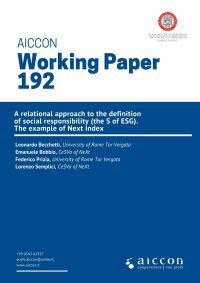192 – A relational approach to the definition of social responsibility (the S of ESG). The example of Next Index
Leonardo Becchetti, University of Rome Tor Vergata
Emanuele Bobbio, CeSVa of NeXt
Federico Prizia, University of Rome Tor Vergata
Lorenzo Semplici, CeSVa of NeXt
Abstract
ESG frameworks have slowly become central in economic and policy choices. This is why it is of utmost importance to build a shared and accepted framework to define what we really mean by ESG overcoming the “minimalist” approach of the DNSH (Do Not Significantly Harm) and moving toward the full achievement of the more ambitious principle of the Substantial Contribution (SC), oriented to the maximization of the social and environmental impact of value creation. To move forward in this direction our work proposes a relational approach for the assessment of ESG factors focusing in particular on the social pillar.
Our approach argues that in order to increase the value of the S it is necessary to assess in an impact perspective both the internal and external relationships of the firm improving at the same time the multidimensional well-being of the workers and the capacity to create sustainable development in the local community.
The main factors on which the firms must operate to reach the goals mentioned above are connected to the domains of sense of community, empowerment, good practices of mutual aid and the degree of participation at an individual, team, organization, and territorial level that can trigger gift giving, reciprocity and trust overcoming standard social dilemmas and producing superadditive outcomes together with high social and environmental impact.
Starting from these elements this work proposes a set of indicators and metrics, based on an original methodology to measure and assess the commitment of a firm in the process to increase the Social factor. This methodology is particularly suited for SMEs and start-up companies.
Keywords: Corporate Social responsibility, ESG, social capital, gift exchange, multidimensional well-being, sustainable development.
JEL numbers: G24 (Ratings and Ratings Agencies); G28 (Government Policy and Regulations); G41 (Role and Effects of Psychological, Emotional, Social and Cognitive Factors on Decision Making in Financial Market); M14 (Corporate Culture, Diversity, Social Responsibility).

